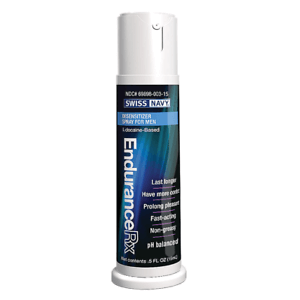Early ejaculation can cause a tremendous amount of anxiety and stress, and men often worry about keeping their partners sexually satisfied. Delayed can prevent users from reaching orgasms prematurely, and they're a popular option with many men. Before using a new personal lubricant, cream, spray, or other delayed ejaculation product, make sure to know how it works. Here's a quick primer.
What's in a Delayed Lubricant?

Most delayed lubricants and sprays contain temporary numbing agents, which prevent ejaculation while allowing some sensation. These ingredients vary in efficacy and their mechanisms of action. Some common ingredients used to delay ejaculation include:
Benzocaine
A topical anesthetic also used in pain relief medications, benzocaine inhibits the brain's ability to register sensations. Climax control products usually use Benzocaine concentrations of 1-10 percent.
Lidocaine
Another common topical anesthetic. Lidocaine (also known as xylocaine or lignocaine) works similarly to Benzocaine to temporarily reduce sensation. Some people are genetically resistant to lidocaine, so it's not always an effective choice.
Peppermint Extract

This is the same extract found in minty kinds of toothpaste and chewing gums. In minimal amounts, peppermint creates a cooling sensation; the brain focuses on the cooling sensation, which delays ejaculation.
Menthol
Menthol is similar to peppermint, but it's synthesized. It has a distinct smell and can provide a more powerful effect than Peppermint Extract.
Capsaicin

Technically, an irritant, capsaicin, is found in chili peppers and other spicy foods. In small amounts, it creates a pleasant warming sensation. If you decide to use a delayed lubricant, be careful to keep numbing agents from directly contacting the urethra.
By applying a small amount of lubricant around the head and shaft of the penis, you can comfortably reduce sensation while still maintaining enough feeling to enjoy sex. The Food and Drug Administration approves Benzocaine, Lidocaine, and the other ingredients listed above as safe ingredients. However, you should never use delayed lubricants on broken skin.

Discontinue use immediately if you experience irritation or pain and wash your hands after handling them; you certainly don't want to accidentally touch your eyes, nose, or other mucous membranes. You can apply delay lubricants before putting on a condom to stop the numbing agents from affecting your partner.
To completely prevent accidental numbing, apply the product at least 5-10 minutes before sexual intercourse; this allows the lube or spray to dry, and it won't start working on contact with skin or membranes. People with PABA allergies should not use Benzocaine, Lidocaine, or other delayed lubricants that contain numbing agents.
Are Delay Lubricants the Right Choice for You?

None of the substances listed above will degrade oil or petroleum-based products, so you can safely use delayed water-based lubricants with condoms and sex toys. Never use oil-based lubricants with condoms.
Some people dislike the sensations (or lack thereof) caused by benzocaine, lidocaine, and other numbing agents. It would be best to experiment with a small amount of lubricant at first, adding more as needed.
Anesthetics affect users differently, so you should exercise some caution when using delaying sprays and lubricants. As is the case with all sex products, you should talk with your partner before using delay sprays, creams, and lubricants.
Communication is your best tool for improving your sex life, although well-chosen lubricants, toys, and other products can certainly help.












